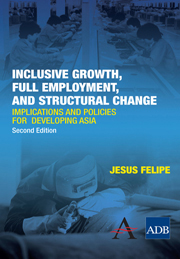 Inclusive Growth, Full Employment, and Structural Change
Inclusive Growth, Full Employment, and Structural Change Book contents
- Frontmatter
- Contents
- Illustrations
- Abbreviations
- Foreword
- Preface and Acknowledgments
- Executive Summary
- Chapter 1 What Is Inclusive Growth?
- Chapter 2 What Is the Main Constraint that Developing Countries Face?
- Chapter 3 Why Full Employment and Who Should Be Responsible for Trying to Achieve It?
- Chapter 4 Why Is Growth Unstable?
- Chapter 5 What Is the Role of Agriculture in the Process of Structural Change and in Delivering Full Employment? Full Employment I
- Chapter 6 What Is the Role of Investment in Delivering Full Employment? Full Employment II
- Chapter 7 Why Is “Planning Development” Necessary?
- Chapter 8 What Is Industrial Policy? Full Employment III
- Chapter 9 Structural Transformation, Industrialization, and Technological Change in Developing Asia: What Does the Empirical Evidence Show?
- Chapter 10 Why Do Export Diversification and Sophistication Matter?
- Chapter 11 Unemployment Versus Inflation: Which One Should Be the Public Enemy Number One?
- Chapter 12 What Should Be the Role of Fiscal and Monetary Policies for Development? Full Employment IV
- Chapter 13 Is It Possible to Achieve Full Employment in the Presence of Structural Transformation?
- Chapter 14 Should the Government (Public Sector) Intervene Directly and Become the Employer of Last Resort? Full Employment V
- Chapter 15 Can Competitiveness and Globalization Deliver Inclusiveness and Full Employment?
- Chapter 16 Export-Led Growth or Domestic Demand–Led Growth?
- Chapter 17 Is Education a Key Ingredient of Inclusive Growth?
- Chapter 18 Conclusions: How Can Developing Countries Implement an Inclusive-Growth and Full-Employment Strategy?
- References
- Author Index
- Subject Index
Chapter 17 - Is Education a Key Ingredient of Inclusive Growth?
- Frontmatter
- Contents
- Illustrations
- Abbreviations
- Foreword
- Preface and Acknowledgments
- Executive Summary
- Chapter 1 What Is Inclusive Growth?
- Chapter 2 What Is the Main Constraint that Developing Countries Face?
- Chapter 3 Why Full Employment and Who Should Be Responsible for Trying to Achieve It?
- Chapter 4 Why Is Growth Unstable?
- Chapter 5 What Is the Role of Agriculture in the Process of Structural Change and in Delivering Full Employment? Full Employment I
- Chapter 6 What Is the Role of Investment in Delivering Full Employment? Full Employment II
- Chapter 7 Why Is “Planning Development” Necessary?
- Chapter 8 What Is Industrial Policy? Full Employment III
- Chapter 9 Structural Transformation, Industrialization, and Technological Change in Developing Asia: What Does the Empirical Evidence Show?
- Chapter 10 Why Do Export Diversification and Sophistication Matter?
- Chapter 11 Unemployment Versus Inflation: Which One Should Be the Public Enemy Number One?
- Chapter 12 What Should Be the Role of Fiscal and Monetary Policies for Development? Full Employment IV
- Chapter 13 Is It Possible to Achieve Full Employment in the Presence of Structural Transformation?
- Chapter 14 Should the Government (Public Sector) Intervene Directly and Become the Employer of Last Resort? Full Employment V
- Chapter 15 Can Competitiveness and Globalization Deliver Inclusiveness and Full Employment?
- Chapter 16 Export-Led Growth or Domestic Demand–Led Growth?
- Chapter 17 Is Education a Key Ingredient of Inclusive Growth?
- Chapter 18 Conclusions: How Can Developing Countries Implement an Inclusive-Growth and Full-Employment Strategy?
- References
- Author Index
- Subject Index
Summary
In the ultimate analysis, people judge economic performance of governments in terms of employment possibilities, educational opportunities, or health care facilities for themselves and their families. The size of the budget deficit, the internal debt of the nation, the balance of payments situation or the expansion of money supply are economic abstractions that are somewhat distant from the daily lives of ordinary people.
—Deepak Nayyar (2008, 20)This final chapter (before the conclusions) deals with the role of education, in particular with issues: (i) knowledge as a public good that produces externalities; (ii) the “low-skill, low-tech map”; and (iii) education, unemployment, and structural change.
In Solow's (1956) neoclassical model, saving rates do not affect longrun growth. The latter is determined by the exogenously given rate of technological progress. Diminishing returns to capital in this model mean that higher savings lead to a decrease in interest rates to the point where the economy saves to keep up with technological progress. Therefore, no matter what the incentives to save are, long-run growth will be at the rate of technological progress. The key issue here is whether diminishing returns to capital do set in. The so-called new theories of growth developed since the 1980s claim that this is not the case if one considers capital in a broader sense. One possible cause is that people have incentives to accumulate human capital, e.g., knowledge of new technologies that economize on labor.
- Type
- Chapter
- Information
- Inclusive Growth, Full Employment, and Structural ChangeImplications and Policies for Developing Asia, pp. 279 - 288Publisher: Anthem PressPrint publication year: 2010
- 1
- Cited by


